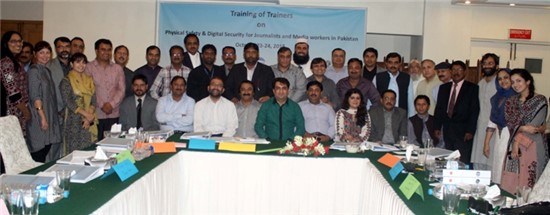
2-day physical safety and digital security media workshop
No story is worth dying for, safety first while undertaking journalistic duties:
Experts ISLAMABAD, 25th October 2015 (INFN): A professional, balanced, planned and ethical reporting reduces risks for journalists and media workers to a larger extent. The journalists should internalize that no story is worth dying for and safety and security should be the first priority while using digital space for journalistic work. This was the punch line of a two-day training workshop for master trainers on “Physical Safety and Digital Security’ organized by Journalists for Democracy and Human Rights (JDHR) in collaboration with and support by International Federation of Journalists (IFJ) and Solidarity Center (SC) for journalists and media workers who came from across Pakistan. President JDHR Shafqat Munir thanked the trainers, IFJ and SC for their support and fellow journalists for participating in the important training. He said this training does not have specific targets that may harm journalists but it gives a general understanding on how to protect their online data and how to undertake safe communication using digital space. Two trainers from IFJ, its director for Asia and the Pacific region Jane Warthington and senior trainer from Nepal Ujjwal Acharya conducted the training through well-designed modules. Internet connectivity and online smart phones expose journalists and their data to vulnerability and risks, which may harm them physically and digitally, the module suggests. The trainers quoted Wikileaks chief Julian Assange as saying: “Cell phone is a tracking device from which you can also make calls.” To ensure safety, journalists were suggested to know where they are going and what to expect. They should do pre assignment security assessment and risk analysis and take into consideration some measures to minimize risks. The journalists were recommended to secure their PC, laptops and all online accounts by installing anti-virus software, updating systems and applications, enabling automatic updates option, making sure your PC’s firewall is on, by using strong passwords having alphanumerical and signs, protect accounts with two-step verification and ‘think first’ to go online as you are exposing to possible hackers or those who may like to track you. While browsing web, do not store passwords in the browser; do not save history or cookies. Run software CCleaner or BleachBit when finish the browsing session. Install the add-ons software HTTPS Everywhere for Chrome and NoScript for Firefox. Ensuring mobile phone security, there is a need to turn off location tracking and geo-tagging for various applications (Apps) on the smartphones unless you are using this feature as part of a targeted project or geo-tag certain media at an event as part of an action. To ensure, mobile security, there is a need to use strong password with alphanumeric with signs so that no one can access to your mobile phone information in case it is lost. The trainers gave a number of tips to save and protect data online and hide revealing of sources of news. The participants including senior journalist and media outlets’ trade union activists thanked JDHR, IFJ and SC for organising such an important training for them so that they can ensure their physical safety and digital security- INFN